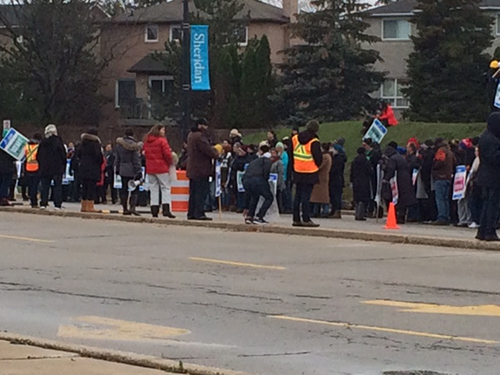“Ford is playing political games,” said Jack Urowitz, president of OPSEU local 244, reacting to the latest labour negotiations between the provincial government and Ontario teachers.

There are three new deals to be reached with educational unions: The Ontario Secondary School Teachers’ Federation (OSSTF) , Elementary Teachers’ Federation of Ontario (ETFO) and the Ontario English Catholic Teachers’ Association (OECTA).
As of November 22, both OSSTF and ETFO are planning to begin work-to-rule campaigns within a week. Although OECTA hasn’t taken this step yet, all three unions received a strike mandate from their members of above 90% (should there be no deal reached).
The Canadian Union of Public Employees reached a contract deal with Doug Ford’s Conservative government on Sunday October 6. For Urowitz, however, further negotiations with education unions will likely come “down to the wire.”
This means that if talks continue to go poorly, there could be the second major educational strike taking place in Ontario in the last two years.
Two years and a provincial election ago, Sheridan’s union was in a similar situation.
In 2017, OPSEU — a union representing thousands of college employees across Ontario — went on strike against the Kathleen Wynne provincial Liberal government. The strikers included Sheridan professors. Students at the college were out of school for more than a month, lost tuition money and missed a large chunk of a semester.
The 2017 college strike mainly revolved around the percentage of college workers who had part-time employee status and were therefore entitled to different pay and benefits. Due to the faculty members’s part-time classification, teachers and assistants often worked identical hours to their full-time counterparts but received less benefits and substantially lower pay.
The current negotiations are with a different provincial administration but bear some resemblances to the troubles that led to the Sheridan strike. The sticking point may prove to be money concerning class sizes.
“Saving money on the back of public service”
Jack Urowitz, President of OPSEU local 244
One of the Ford government’s plans to trim money from the education budget is to increase the amount of students in each class, lowering the number of classes overall and, therefore, the amount of teachers who must be paid. The figures the teachers unions expect in their new contracts is close to a billion dollars more than the Ford government has said it is willing to pay.
Urowitz believes that the motivations behind the two strikes are different, with Ford’s being more designed by the premier to appeal to his conservative base. That being said, strife between government and education unions always follow a common theme. Urowitz believes “the expense of the strike” is often on the students.
Publicly funded programs like medicine and education are often discussed as areas where governments can save money but Urowitz stresses that there “are limits to the quality of education” when it comes to decreased funding. Lorraine Cabbab, a former early education educator (ECE), agrees.
“Children need consistency,” Cabbab says. She worked at a daycare in the distillery district of Toronto until recently, when she had to leave following cuts to education subsidies.
Premier Doug Ford made cuts to the existing Provincial Wage Enhancement (PWE) that had been put in place by the previous Liberal government under Kathleen Wynne. The PWE added two dollars per hour to the wages of many of the province’s education workers. Cabbab stressed that the elimination of this program had a big impact on the morale of teachers and their students.
“The resources that they need”
Former ECE Lorraine Cabbab discussing the cuts to the Provincial Wage Enhancement
“[They] weren’t happy with the pay they were getting,” she said, stressing that teachers couldn’t get “the resources that they need,” to care for children.
If the Ford government takes a hard line with elementary and high school staff it could cause inconvenience for Sheridan students who have children or siblings under 18. Perhaps more concerning though, will be what a breakdown of negotiations could say about the Ford government’s attitude towards the education sector as a whole.
Asked for comment on the upcoming negotiations, Sandra Zeni, Senior Media Relations Coordinator for Education Minister Stephen Lecce said, “We are committed to work[ing] constructively,” with the unions.
“The ministry welcomes input at the bargaining table on how we can work together to enhance student achievement,” she added but stressed it must be done “in a cost effective and efficient manner.”
Sheridan teacher contracts will be up for negotiation again in the fall of 2021, the likely time of Doug Ford’s re-election campaign.
The timing of these renegotiations could cause substantial disruptions to Sheridan life. Efforts to trim a province’s education budget come from both major political parties. What is certain is that, regardless of who is to blame, stalled negotiations, work-to-rule campaigns and strike action is to the detriment of everyone’s education.
Asked how students can make their voices heard about the importance of education, Urowitz acknowledges it can be difficult.
“Sober and serious protests” could do something he says, adding that it was effective and touching in 2017 when Sheridan students “went out on the lines with teachers.”



